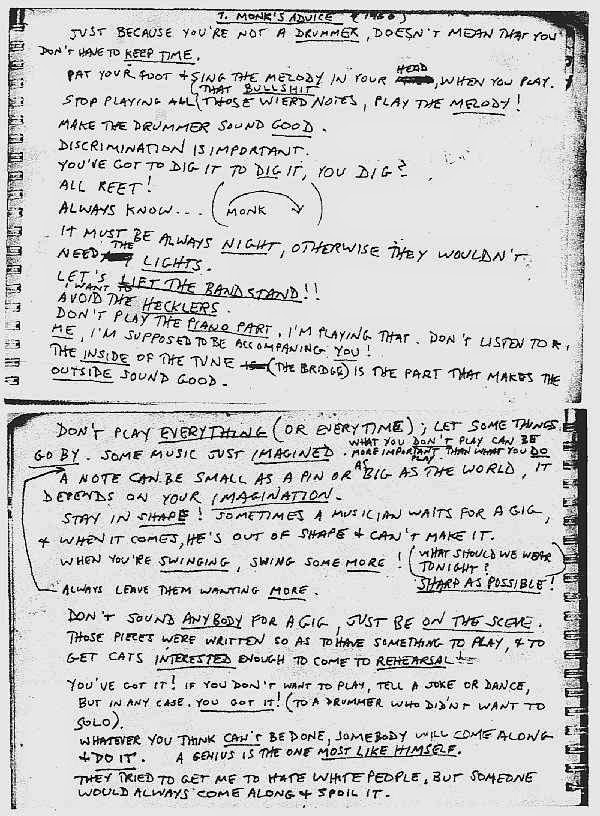Advice on Practice, Performance, and More
Sometimes sage advice, especially from the Masters of their art, deserves to be repeated. Here are 3 different sets of rules/tips from 3 amazing artists: Thelonious Monk, Steve Lacy, and John Cage. While they are written more with music/musicians in mind, they can be adapted to any sort of art & creativity.
How do you approach practice & performance?
~ MB
Thelonious Monk’s advice to saxophonist Steve Lacy (1960)
Steve Lacy's Tips on Practicing
- Teaching is an act of generosity; it is awareness that one has something to give, and adesire to give it.
- Music knows no limits. Don’t set up exclusionary boundaries.
- Practice slowly. Practicing slowly holds it own technical challenges-and makes even more difficult demands on the spirit. It calls for patience when the world demands results, and quiet single- minded focus in the face of huge repertoire demands. It is the ‘Zen’ way.
- Strive for straightforward purity and logical simplicity.
- Find rhythm in more subtle forms than a metronome. Always strive for forwardmotion and impetus.
- Rhythm is all and everywhere.
- Strive to develop an individual sound and playing style. Have your own voice.
- Be disciplined. Study and practice hard.
-Concentrate on pitch, rhythm, dynamics and tonal sonority.
- Expand your music making vocabularies by searching through some unusual lexicons.
- Think of it as "Sound Research": Collecting sounds and growing melodies in a garden.
- View the Saxophone as an "Interval Machine". Practice a variety of intervals in a variety of rhythmical combinations.
- Never become fixed on patterned sequences that can become stale and block creativity.
- "Shake up the bag" inside of your head. Move out of the familiar and typical in order to be able to create something new.
- The interval machine can become Zen-like and expand perception. Take the interval of a minor second and play it up and down over and over again. After about 40 minutes you will no longer be bored and will start to hallucinate. The half step interval will become enormous. Your ear has changed. Small has now become large. Now, when you leave this space and go back to the rest of the horn, everything has changed and your perceptions have altered. Illumination and Metamorphosis.
- Take a limited subject and spend an unlimited amount of time on it until it opens up.
- Learn to let things cook!
John Cage's Rules For Teachers & Students
~ MB





Comments
Post a Comment